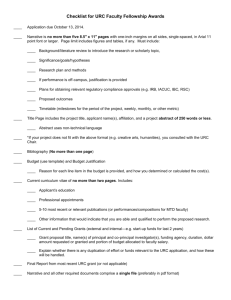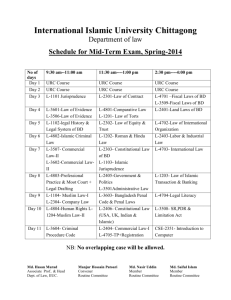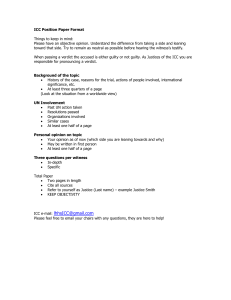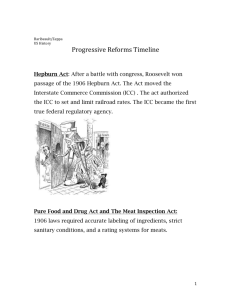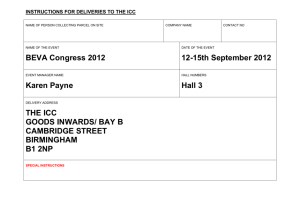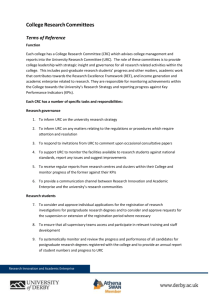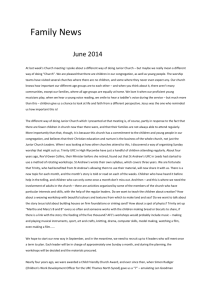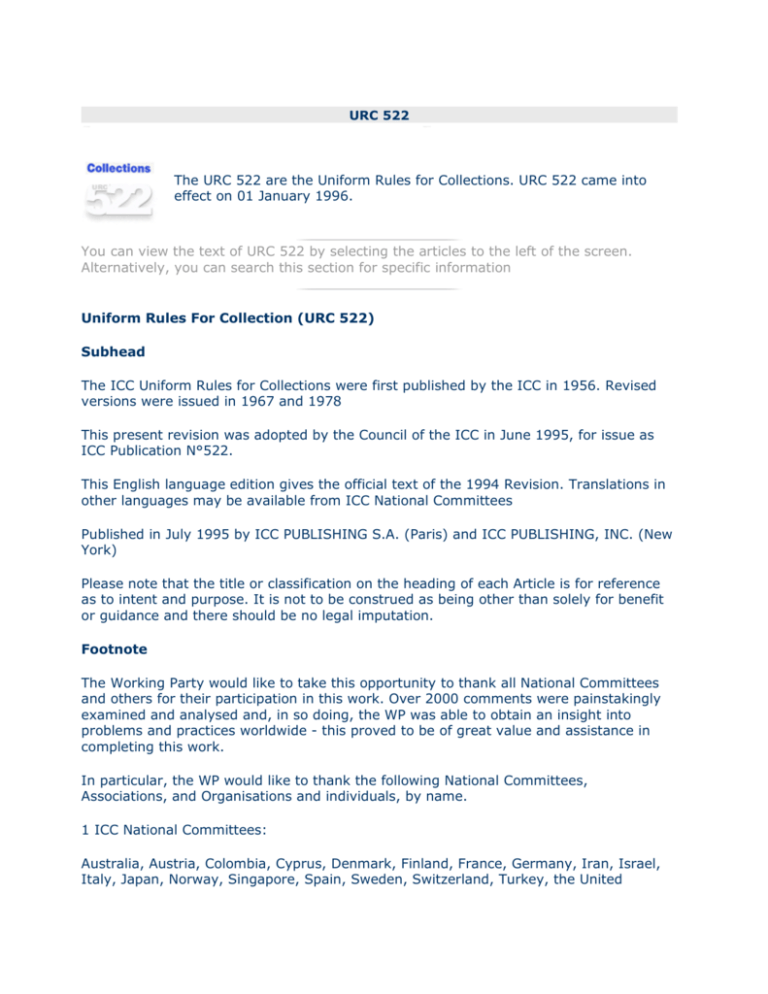
URC 522
The URC 522 are the Uniform Rules for Collections. URC 522 came into
effect on 01 January 1996.
You can view the text of URC 522 by selecting the articles to the left of the screen.
Alternatively, you can search this section for specific information
Uniform Rules For Collection (URC 522)
Subhead
The ICC Uniform Rules for Collections were first published by the ICC in 1956. Revised
versions were issued in 1967 and 1978
This present revision was adopted by the Council of the ICC in June 1995, for issue as
ICC Publication N°522.
This English language edition gives the official text of the 1994 Revision. Translations in
other languages may be available from ICC National Committees
Published in July 1995 by ICC PUBLISHING S.A. (Paris) and ICC PUBLISHING, INC. (New
York)
Please note that the title or classification on the heading of each Article is for reference
as to intent and purpose. It is not to be construed as being other than solely for benefit
or guidance and there should be no legal imputation.
Footnote
The Working Party would like to take this opportunity to thank all National Committees
and others for their participation in this work. Over 2000 comments were painstakingly
examined and analysed and, in so doing, the WP was able to obtain an insight into
problems and practices worldwide - this proved to be of great value and assistance in
completing this work.
In particular, the WP would like to thank the following National Committees,
Associations, and Organisations and individuals, by name.
1 ICC National Committees:
Australia, Austria, Colombia, Cyprus, Denmark, Finland, France, Germany, Iran, Israel,
Italy, Japan, Norway, Singapore, Spain, Sweden, Switzerland, Turkey, the United
Kingdom and the United States.
2 Associations and Organisations:
Akbank (Turkey), Antiochian Commercial Bank, Asociación de Bancos del Uruguay,
Association of Banks in Singapore, Association of Cyprus Commercial Banks,
Associazione Bancaria Italiana, Banco Bancoquia (Colombia), Banco Anglo Colombiano
(Colombia), Banco de Bogota (Colombia), Banco do Brasil S.A., Banco del Estado
(Colombia), Banco Nacional de Cuba, Banco Popular Español, Banco Sabadell (Spain),
Banco Union Colombiano (Colombia), Bank Association of Slovenia, Bankhaus Trinkaus &
Burkhardt (Germany), British Bankers' Association (Trade Facilitation Consultative
Group), Canadian Bankers' Association, Central Hispaño (Spain), Chemical Bank (USA),
Citibank (USA), Clearing Bankers Association (South Africa), Courtaulds Export (UK), Den
Danske Bank (Denmark), Deutscher Sparkassenund Giroverband (Germany), DG Bank
(Germany), Emlak Bankasi (Turkey), FELABAN (Federation of Latin American Banks),
Finansradet (Denmark), Foreign Exchange Dealers' Association of India, Forex Club
Argentino, German Banking Federation, German Savings Banks Organisation, Hellenic
Bank Association, The Hong Kong Association of Banks, Internationale Nederlanden
Bank, Israel Discount Bank, Japan Foreign Trade Council, Nederlandse Vereniging van
Banken, Nordbanken (Sweden), Overseas Union Bank Ltd (Singapore), Serfin Financial
Group (Mexico), State Bank (Colombia), Swiss Bank Corporation, T.O. Lee Consultants
Ltd (Hong Kong), Texas Commerce Bank N.A. (USA), Turk Ekonomi Bankasi (Turkey),
Udruzenje Banaka Jugoslavije, Unibank (Denmark), United States Council on
International Banking, Inc., Westpac Banking Corporation (Australia)
3 Individuals:
Ferdinand Müller, Technical Advisor, ICC Banking
Commission, Deutsche Bank AG (Germany)
Bernard Wheble, CBE (UK)
Charles del Busto, Chairman, ICC Banking Commission
Sia Chee-Hong, Overseas Union Bank Ltd. (Singapore)
The WP would also like to express their appreciation for the assistance of
- Stefan Draszczyk, former Head of Banking Division, ICC Paris
- Carlos Velez-Rodriguez, Head of Banking Division, ICC Paris
- Secretaries, ICC Paris
Bob Mansell and Sue Davis, The Hongkong and Shanghai
Banking Corporation, Ltd. ( London)
and
- Members of the ICC Banking Commission
Foreword
The raison d'être for the existence of the ICC is to facilitate trade among the world's
trading countries, within which one of our core tasks is an ongoing review of international
trade practices in various fields.
Accordingly, the ICC undertook a review of the Uniform Rules for Collections in March
1993, and these revised rules, which represent the culmination of the revision work,
have were drafted by international experts drawn from the private sector who have
worked in ICC Commissions over the last two years.
The review covered changes in collection procedures, technology, and laws and
regulations, both national and international.
From the perspective of the ICC, a significant achievement of the revision is that National
Committees and experts from all parts of the world took an active part in the discussions
and made a positive contribution to the work.
These revised rules and their unanimous adoption by members of the ICC Banking
Commission, which has a wide international representation, are a source of pride to us
all, and the extensive and fruitful international consultation which preceded this work is
the hallmark of the ICC.
Jean-Charles Rouher
Secretary General of the ICC
Preface
In keeping with the ICC policy of staying abreast of changes in international commerce,
the ICC Banking Commission initiated a revision of Uniform Rules for Collections in March
1993, and these revised rules represent the work of the ICC Working Party entrusted
with the revision project since that time.
The revised rules, which come into effect on 1 January, 1996, replace the Uniform Rules
for Collections, ICC publication N°322, in force since January 1979. There is a separate
new ICC publication, N°550, containing a comprehensive commentary covering relevant
discussions that took place during the revision process. The commentary, which is
intended to give guidance on practical issues and to provide an insight into the thinking
of the Working Party, is not meant to replace the rules in any way.
The objectives of the Working Party were to review changes in international collection
procedures, technology, and laws and regulations both national and international since
1979. Similarly, issues that continue to cause problems to practitioners were to be
examined to see the extent to which the revision could assist in their resolution.
Additionally, the text and language of UCP 500 were to be examined in order to achieve
a degree of harmonisation within the revision.
In the course of its work over the last two years, the Working Party examined
approximately 2,500 comments from over 30 countries. In certain cases, such as in
considering of Electronic Data Interchange, the Working Party felt that uncertainty on
legal issues precluded any attempt to draft rules to cover this aspect at the present time.
Similarly, while the importance of local practices and requirements in certain countries
were fully appreciated by the Working Party, it was considered unwise to draft rules to
cover such practices and requirements, as they might not be acceptable to the rest of
the international community.
In considering an extensive range of views and comments, the Working Party had
considerable difficulty in evaluating some of them, and, where conflicting views were
expressed, the Working Party adopted the point of view closest to, and most consistent
with, accepted international practice.
The Working Party, in achieving its objectives, did not seek to make change for the sake
of change and often left the wording of the old rules substantially unchanged. Changes
were made only in response to altered practices and requirements and to resolve
practical difficulties encountered by practitioners.
The Working Party, in achieving its objectives, did not seek to make change for the sake
of change and often left the wording of the old rules substantially unchanged. Changes
were made only in response to altered practices and requirements and to resolve
practical difficulties encountered by practitioners.
I list below in alphabetical order the members of the Working Party:
JUNEID M. BAJUNEID Assistant Manager Trade Services,
the National Commercial Bank, Jeddah
CARLO DI NINNI Documentary Credit Department,
Associazione Bancaria Italiana, Rome
STEFAN DRASZCYK Former Head of Division, International Chamber of Commerce, Paris
BERND HOFFMANN Direktor, Trinkaus & Burkhardt KGaA, Düsseldorf
ROB F. LANTING Senior Manager, Documentary Trade Department, ING Bank,
Amsterdam
PETER OSTWALD Vice President, Trade Finance Department, Nordbanken, Gothenburge
Finance Department,
PAUL C. RUSSO Vice President, United States Council for International Banking, New
York
SIA CHEE-HONG Vice President Bills and Remittances,
Overseas Union Bank Ltd, Singapore
CARLOZ VELEZ-RODRIGUEZ Head of Division,
International Chamber of Commerce, Paris
The undersigned had the pleasure of chairing the Working Party.
As Chairman, I extend my deep appreciation to the ICC National Committees, the
Banking Commission and the individual members of the Working Party. It was through
the generous contribution of their time and the sharing of their knowledge that this
revision was accomplished so successfully. I also wish to convey the gratitude of the ICC
for their selfless commitment to this work.
LAKSHMAN, Y. WICKREMERATNE ACIB
Chairman, ICC Working Party on Collections
Former Manager Services, The Hongkong and Shanghai Banking Corporation Ltd, London
Chairman, British Bankers' Association Trade Facilitation Group, 1992-1994
Copyright
Copyright © 1995
International Chamber of Commerce
All rights reserved. No part of this work may be reproduced or copied in any form or by
any means - graphic, electronic or mechanical, including photocopying, recording, taping
or information retrieval systems - without the written permission of ICC Publishing S.A,
or ICC Publishing, Inc. for the USA.
ICC Publication N° 522
ISBN 92-842-1184.0
URC 522 - Article 1
ARTICLE 1 APPLICATION OF URC 522
a The Uniform Rules for Collections, 1995 Revision, ICC Publication No. 522, shall
apply to all collections as defined in Article 2 where such rules are incorporated into
the text of the "collection instruction" referred to in Article 4 and are binding on all
parties thereto unless otherwise expressly agreed or contrary to the provisions of a
national, state or local law and/or regulation which cannot be departed from.
b Banks shall have no obligation to handle either a collection or any collection
instruction or subsequent related instructions.
c If a bank elects, for any reason, not to handle a collection or any related
instructions received by it, it must advise the party from whom it received the
collection or the instructions by telecommunication or, if that is not possible, by
other expeditious means, without delay.
URC 522 - Article 2
ARTICLE 2 DEFINITION OF COLLECTION
For the purposes of these Articles:
a "Collection" means the handling by banks of documents as defined in sub-Article
2(b), in accordance with instructions received, in order to:
1 obtain payment and/or acceptance,
or
2 deliver documents against payment and/or against acceptance,
or
3 deliver documents on other terms and conditions.
b "Documents" means financial documents and/or commercial documents:
1 "Financial documents" means bills of exchange, promissory notes, cheques, or
other similar instruments used for obtaining the payment of money;
2 "Commercial documents" means invoices, transport documents, documents of title
or other similar documents, or any other documents whatsoever, not being financial
documents.
c "Clean collection" means collection of financial documents not accompanied by
commercial documents.
d "Documentary collection" means collection of:
1 Financial documents accompanied by commercial documents;
2 Commercial documents not accompanied by financial documents.
URC 522 - Article 3
ARTICLE 3 PARTIES TO A COLLECTION
a For the purposes of these Articles the "parties thereto" are:
1 the "principal" who is the party entrusting the handling of a collection to a bank;
2 the "remitting bank" which is the bank to which the principal has entrusted the
handling of a collection;
3 the "collecting bank" which is any bank, other than the remitting bank, involved in
processing the collection;
4 the "presenting bank" which is the collecting bank making presentation to the
drawee.
b The "drawee" is the one to whom presentation is to be made in accordance with
the collection instruction.
URC 522 - Article 4
ARTICLE 4 COLLECTION INSTRUCTION
a 1 All documents sent for collection must be accompanied by a collection
instruction indicating that the collection is subject to URC 522 and giving
complete and precise instructions. Banks are only permitted to act upon
the instructions given in such collection instruction, and in accordance
with these Rules.
2 Banks will not examine documents in order to obtain instructions.
3 Unless otherwise authorised in the collection instruction, banks will
disregard any instructions from any party/bank other than the party/bank
from whom they received the collection.
b A collection instruction should contain the following items of
information, as appropriate.
1 Details of the bank from which the collection was received including full
name, postal and SWIFT addresses, telex, telephone, facsimile numbers
and reference.
2 Details of the principal including full name, postal address, and if
applicable telex, telephone and facsimile numbers.
3 Details of the drawee including full name, postal address, or the
domicile at which presentation is to be made and if applicable telex,
telephone and facsimile numbers.
4 Details of the presenting bank, if any, including full name, postal
address, and if applicable telex, telephone and facsimile numbers.
5 Amount(s) and currency(ies) to be collected.
6 List of documents enclosed and the numerical count of each document.
7 a. Terms and conditions upon which payment and/or acceptance is to
be obtained.
b. Terms of delivery of documents against:
1) payment and/or acceptance
2) other terms and conditions
It is the responsibility of the party preparing the collection instruction to
ensure that the terms for the delivery of documents are clearly and
unambiguously stated, otherwise banks will not be responsible for any
consequences arising therefrom.
8 Charges to be collected, indicating whether they may be waived or not.
9 Interest to be collected, if applicable, indicating whether it may be
waived or not, including:
a. rate of interest
b. interest period
c. basis of calculation (for example 360 or 365 days in a year) as
applicable.
10 Method of payment and form of payment advice.
11 Instructions in case of non-payment, non-acceptance and/or noncompliance with other instructions.
c 1 Collection instructions should bear the complete address of the
drawee or of the domicile at which the presentation is to be made. If the
address is incomplete or incorrect, the collecting bank may, without any
liability and responsibility on its part, endeavour to ascertain the proper
address.
2 The collecting bank will not be liable or responsible for any ensuing
delay as a result of an incomplete/incorrect address being provided.
URC 522 - Article 5
ARTICLE 5 PRESENTATION
a For the purposes of these Articles, presentation is the procedure
whereby the presenting bank makes the documents available to the
drawee as instructed.
b The collection instruction should state the exact period of time within
which any action is to be taken by the drawee.
Expressions such as "first", "prompt", "immediate", and the like should
not be used in connection with presentation or with reference to any
period of time within which documents have to be taken up or for any
other action that is to be taken by the drawee. If such terms are used
banks will disregard them.
c Documents are to be presented to the drawee in the form in which they
are received, except that banks are authorised to affix any necessary
stamps, at the expense of the party from whom they received the
collection unless otherwise instructed, and to make any necessary
endorsements or place any rubber stamps or other identifying marks or
symbols customary to or required for the collection operation.
d For the purpose of giving effect to the instructions of the principal, the
remitting bank will utilise the bank nominated by the principal as the
collecting bank. In the absence of such nomination, the remitting bank
will utilise any bank of its own, or another bank's choice in the country of
payment or acceptance or in the country where other terms and
conditions have to be complied with.
e The documents and collection instruction may be sent directly by the
remitting bank to the collecting bank or through another bank as
intermediary.
f If the remitting bank does not nominate a specific presenting bank, the
collecting bank may utilise a presenting bank of its choice.
URC 522 - Article 6
ARTICLE 6 SIGHT/ACCEPTANCE
In the case of documents payable at sight the presenting bank must
make presentation for payment without delay. In the case of documents
payable at a tenor other than sight the presenting bank must, where
acceptance is called for, make presentation for acceptance without delay,
and where payment is called for, make presentation for payment not later
than the appropriate maturity date.
URC 522 - Article 7
ARTICLE 7 RELEASE OF COMMERCIAL DOCUMENTS
Documents Against Acceptance (D/A) vs.Documents Against Payment
(D/P)
a Collections should not contain bills of exchange payable at a future date
with instructions that commercial documents are to be delivered against
payment.
b If a collection contains a bill of exchange payable at a future date, the
collection instruction should state whether the commercial documents are
to be released to the drawee against acceptance (D/A) or against
payment (D/P).
In the absence of such statement commercial documents will be released
only against payment and the collecting bank will not be responsible for
any consequences arising out of any delay in the delivery of documents.
c If a collection contains a bill of exchange payable at a future date and
the collection instruction indicates that commercial documents are to be
released against payment, documents will be released only against such
payment and the collecting bank will not be responsible for any
consequences arising out of any delay in the delivery of documents.
URC 522 - Article 8
ARTICLE 8 CREATION OF DOCUMENTS
Where the remitting bank instructs that either the collecting bank or the
drawee is to create documents (bills of exchange, promissory notes, trust
receipts, letters of undertaking or other documents) that were not
included in the collection, the form and wording of such documents shall
be provided by the remitting bank, otherwise the collecting bank shall not
be liable or responsible for the form and wording of any such document
provided by the collecting bank and/or the drawee.
URC 522 - Article 9
ARTICLE 9 GOOD FAITH AND REASONABLE CARE
Banks will act in good faith and exercise reasonable care.
URC 522 - Article 10
ARTICLE 10 DOCUMENTS vs. GOODS, SERVICES, PERFORMANCES
a Goods should not be despatched directly to the address of a bank or
consigned to or to the order of a bank without prior agreement on the
part of that bank.
Nevertheless, in the event that goods are despatched directly to the
address of a bank or consigned to or to the order of a bank for release to
a drawee against payment or acceptance or upon other terms and
conditions without prior agreement on the part of that bank, such bank
shall have no obligation to take delivery of the goods, which remain at the
risk and responsibility of the party despatching the goods.
b Banks have no obligation to take any action in respect of the goods to
which a documentary collection relates, including storage and insurance
of the goods even when specific instructions are given to do so. Banks will
only take such action if, when, and to the extent that they agree to do so
in each case. Notwithstanding the provisions of sub-Article 1(c) this rule
applies even in the absence of any specific advice to this effect by the
collecting bank.
c Nevertheless, in the case that banks take action for the protection of the
goods, whether instructed or not, they assume no liability or responsibility
with regard to the fate and/or condition of the goods and/or for any acts
and/or omissions on the part of any third parties entrusted with the
custody and/or protection of the goods. However, the collecting bank
must advise without delay the bank from which the collection instruction
was received of any such action taken.
d Any charges and/or expenses incurred by banks in connection with any
action taken to protect the goods will be for the account of the party from
whom they received the collection.
e 1 Notwithstanding the provisions of sub-Article 10(a), where the goods
are consigned to or to the order of the collecting bank and the drawee has
honoured the collection by payment, acceptance or other terms and
conditions, and the collecting bank arranges for the release of the goods,
the remitting bank shall be deemed to have authorised the collecting bank
to do so.
2 Where a collecting bank on the instructions of the remitting bank or in
terms of sub-Article 10(e)i, arranges for the release of the goods, the
remitting bank shall indemnify such collecting bank for all damages and
expenses incurred.
URC 522 - Article 11
ARTICLE 11 DISCLAIMER FOR ACTS OF AN INSTRUCTED PARTY
a Banks utilising the services of another bank or other banks for the
purpose of giving effect to the instructions of the principal, do so for the
account and at the risk of such principal.
b Banks assume no liability or responsibility should the instructions they
transmit not be carried out, even if they have themselves taken the
initiative in the choice of such other bank(s).
c A party instructing another party to perform services shall be bound by
and liable to indemnify the instructed party against all obligations and
responsibilities imposed by foreign laws and usages.
URC 522 - Article 12
ARTICLE 12 DISCLAIMER ON DOCUMENTS RECEIVED
a Banks must determine that the documents received appear to be as
listed in the collection instruction and must advise by telecommunication
or, if that is not possible, by other expeditious means, without delay, the
party from whom the collection instruction was received of any
documents missing, or found to be other than listed.
Banks have no further obligation in this respect.
b If the documents do not appear to be listed, the remitting bank shall be
precluded from disputing the type and number of documents received by
the collecting bank.
c Subject to sub-Article 5(c) and sub-Articles 12(a) and 12(b) above,
banks will present documents as received without further examination.
URC 522 - Article 13
ARTICLE 13 DISCLAIMER ON EFFECTIVENESS OF DOCUMENTS
Banks assume no liability or responsibility for the form, sufficiency,
accuracy, genuineness, falsification or legal effect of any document(s), or
for the general and/or particular conditions stipulated in the document(s)
or superimposed thereon; nor do they assume any liability or
responsibility for the description, quantity, weight, quality, condition,
packing, delivery, value or existence of the goods represented by any
document(s), or for the good faith or acts and/or omissions, solvency,
performance or standing of the consignors, the carriers, the forwarders,
the consignees or the insurers of the goods, or any other person
whomsoever
URC 522 - Article 14
ARTICLE 14 DISCLAIMER ON DELAYS, LOSS IN TRANSIT AND
TRANSLATION
a Banks assume no liability or responsibility for the consequences arising
out of delay and/or loss in transit of any message(s), letter(s) or
document(s), or for delay, mutilation or other error(s) arising in
transmission of any telecommunication or for error(s) in translation
and/or interpretation of technical terms.
b Banks will not be liable or responsible for any delays resulting from the
need to obtain clarification of any instructions received.
URC 522 - Article 15
ARTICLE 15 FORCE MAJEURE
Banks assume no liability or responsibility for consequences arising out of
the interruption of their business by Acts of God, riots, civil commotions,
insurrections, wars, or any other causes beyond their control or by strikes
or lockouts.
URC 522 - Article 16
ARTICLE 16 PAYMENT WITHOUT DELAY
a Amounts collected (less charges and/or disbursements and/or expenses
where applicable) must be made available without delay to the party from
whom the collection instruction was received in accordance with the terms
and conditions of the collection instruction.
b Notwithstanding the provisions of sub-Article 1(c), and unless otherwise
agreed, the collecting bank will effect payment of the amount collected in
favour of the remitting bank only.
URC 522 - Article 17
ARTICLE 17 PAYMENT IN LOCAL CURRENCY
In the case of documents payable in the currency of the country of
payment (local currency), the presenting bank must, unless otherwise
instructed in the collection instruction, release the documents to the
drawee against payment in local currency only if such currency is
immediately available for disposal in the manner specified in the collection
instruction.
URC 522 - Article 18
ARTICLE 18 PAYMENT IN FOREIGN CURRENCY
In the case of documents payable in a currency other than that of the
country of payment (foreign currency), the presenting bank must, unless
otherwise instructed in the collection instruction, release the documents
to the drawee against payment in the designated foreign currency only if
such foreign currency can immediately be remitted in accordance with the
instructions given in the collection instruction.
URC 522 - Article 19
ARTICLE 19 PARTIAL PAYMENTS
a In respect of clean collections, partial payments may be accepted if and
to the extent to which and on the conditions on which partial payments
are authorised by the law in force in the place of payment. The financial
document(s) will be released to the drawee only when full payment
thereof has been received.
b In respect of documentary collections, partial payments will only be
accepted if specifically authorised in the collection instruction. However,
unless otherwise instructed, the presenting bank will release the
documents to the drawee only after full payment has been received, and
the presenting bank will not be responsible for any consequences arising
out of any delay in the delivery of documents.
c In all cases partial payments will be accepted only subject to compliance
with the provisions of either Article 17 or Article 18 as appropriate.
Partial payment, if accepted, will be dealt with in accordance with the
provisions of Article 16.
URC 522 - Article 20
ARTICLE 20 INTEREST
a If the collection instruction specifies that interest is to be collected and
the drawee refuses to pay such interest, the presenting bank may deliver
the document(s) against payment or acceptance or on other terms and
conditions as the case may be, without collecting such interest, unless
sub-Article 20(c) applies.
b Where such interest is to be collected, the collection instruction must
specify the rate of interest, interest period and basis of calculation.
c Where the collection instruction expressly states that interest may not
be waived and the drawee refuses to pay such interest the presenting
bank will not deliver documents and will not be responsible for any
consequences arising out of any delay in the delivery of document(s).
When payment of interest has been refused, the presenting bank must
inform by telecommunication or, if that is not possible, by other
expeditious means without delay the bank from which the collection
instruction was received.
URC 522 - Article 21
ARTICLE 21 CHARGES AND EXPENSES
a If the collection instruction specifies that collection charges and/or
expenses are to be for account of the drawee and the drawee refuses to
pay them, the presenting bank may deliver the document(s) against
payment or acceptance or on other terms and conditions as the case may
be, without collecting charges and/or expenses, unless sub-Article 21(b)
applies.
Whenever collection charges and/or expenses are so waived they will be
for the account of the party from whom the collection was received and
may be deducted from the proceeds.
b Where the collection instruction expressly states that charges and/or
expenses may not be waived and the drawee refuses to pay such charges
and/or expenses, the presenting bank will not deliver documents and will
not be responsible for any consequences arising out of any delay in the
delivery of the document(s). When payment of collection charges and/or
expenses has been refused the presenting bank must inform by
telecommunication or, if that is not possible, by other expeditious means
without delay the bank from which the collection instruction was received.
c In all cases where in the express terms of a collection instruction or
under these Rules, disbursements and/or expenses and/or collection
charges are to be borne by the principal, the collecting bank(s) shall be
entitled to recover promptly outlays in respect of disbursements,
expenses and charges from the bank from which the collection instruction
was received, and the remitting bank shall be entitled to recover promptly
from the principal any amount so paid out by it, together with its own
disbursements, expenses and charges, regardless of the fate of the
collection.
d Banks reserve the right to demand payment of charges and/or
expenses in advance from the party from whom the collection instruction
was received, to cover costs in attempting to carry out any instructions,
and pending receipt of such payment also reserve the right not to carry
out such instructions.
URC 522 - Article 22
ARTICLE 22 ACCEPTANCE
The presenting bank is responsible for seeing that the form of the
acceptance of a bill of exchange appears to be complete and correct, but
is not responsible for the genuineness of any signature or for the
authority of any signatory to sign the acceptance.
URC 522 - Article 23
ARTICLE 23 PROMISSORY NOTES AND OTHER INSTRUMENTS
The presenting bank is not responsible for the genuineness of any
signature or for the authority of any signatory to sign a promissory note,
receipt, or other instruments.
URC 522 - Article 24
ARTICLE 24 PROTEST
The collection instruction should give specific instructions regarding
protest (or other legal process in lieu thereof), in the event of non-
payment or non-acceptance.
In the absence of such specific instructions, the banks concerned with the
collection have no obligation to have the document(s) protested (or
subjected to other legal process in lieu thereof) for non-payment or nonacceptance.
Any charges and/or expenses incurred by banks in connection with such
protest, or other legal process, will be for the account of the party from
whom the collection instruction was received.
URC 522 - Article 25
ARTICLE 25 CASE-OF-NEED
If the principal nominates a representative to act as case-of-need in the
event of non-payment and/or non-acceptance the collection instruction
should clearly and fully indicate the powers of such case-of-need. In the
absence of such indication banks will not accept any instructions from the
case-of-need.
URC 522 - Article 26
ARTICLE 26 ADVICES
Collecting banks are to advise fate in accordance with the following rules:
a FORM OF ADVICE
All advices or information from the collecting bank to the bank from which
the collection instruction was received, must bear appropriate details
including, in all cases, the latter bank's reference as stated in the
collection instruction.
b METHOD OF ADVICE
It shall be the responsibility of the remitting bank to instruct the collecting
bank regarding the method by which the advices detailed in sub-Articles
(c)i, (c)ii and (c)iii are to be given. In the absence of such instructions,
the collecting bank will send the relative advices by the method of its
choice at the expense of the bank from which the collection instruction
was received.
c 1 ADVICE OF PAYMENT
The collecting bank must send without delay advice of payment to the
bank from which the collection instruction was received, detailing the
amount or amounts collected, charges and/or disbursements and/or
expenses deducted, where appropriate, and method of disposal of the
funds.
2 ADVICE OF ACCEPTANCE
The collecting bank must send without delay advice of acceptance to the
bank from which the collection instruction was received.
3 ADVICE OF NON-PAYMENT AND/OR NON-ACCEPTANCE
The presenting bank should endeavour to ascertain the reasons for nonpayment and/or non-acceptance and advise accordingly, without delay,
the bank from which it received the collection instruction.
The presenting bank must send without delay advice of non-payment
and/or advice of non-acceptance to the bank from which it received the
collection instruction.
On receipt of such advice the remitting bank must give appropriate
instructions as to the further handling of the documents. If such
instructions are not received by the presenting bank within 60 days after
its advice of non-payment and/or non-acceptance, the documents may be
returned to the bank from which the collection instruction was received
without any further responsibility on the part of the presenting bank.

